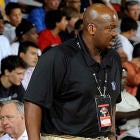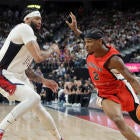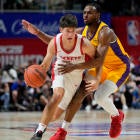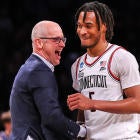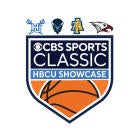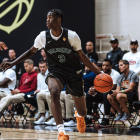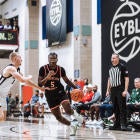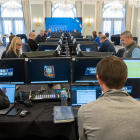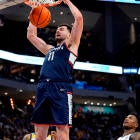You can say you were shocked Tuesday when you heard the details of the FBI's bombshell investigation into corruption in big-time college basketball that landed four assistants at prominent Division I schools in federal custody.
You can be shocked at the details of the allegations: That Jim Gatto, Adidas' head of global marketing for basketball, arranged payments for high school players and their families in exchange for their commitment to Adidas-affiliated schools. That four assistant coaches at big-time programs -- Book Richardson at Arizona, Tony Bland at USC, Chuck Person at Auburn and Lamont Evans at Oklahoma State -- have been arrested and charged in a corruption scheme. That an Adidas representative offered $150,000 to an elite high school player to attend the University of Miami. That the shoe company paid $100,000 for a McDonald's All-American to commit to the University of Louisville this spring.
"The picture painted by the charges brought today is not a pretty one," Joon Kim, the acting U.S. Attorney for the Southern District of New York, said at a press conference. "Coaches at some of the nation's top programs soliciting and accepting cash bribes. Managers and financial advisers circling blue-chip prospects like coyotes. And employees of one of the world's largest sportswear companies secretly funneling cash to the families of high school recruits."
You can say you were shocked by the details of these alleged federal crimes, and the fact that the federal government saw it so important that it got this deeply involved in an investigation into college sports corruption.
But you cannot say you were surprised at the overall picture painted by these charges.
Because the theme of this story, which may end up as one of the biggest scandals in college sports history, is the same one that's plagued big-time college basketball for generations.
On the surface, the theme here is simple: Coaches cheat because they want to win.
It's clearly more complicated than that.
This cheating is a natural economic outgrowth of an amateur athletics system that had major flaws from the start. Back in the day, people thought of amateur collegiate sports as the last pure place in the sporting landscape where players play for the love of the game and a free college education.
But the moment that big money was thrown into ostensibly "amateur" sports -- the moment television contracts grew into the billions and head coaches' salaries grew into the millions and shoe companies bought multiyear team sponsorships for tens of millions -- is when a black market was created for these players.
Of course this was going to happen. When elite amateur athletes are unable to get their market value from a school -- when a future No. 1 pick gets "paid" with the same scholarship that the 13th player on the bench gets "paid" -- the capitalistic nature of college sports is stalled. Instead of getting his fair market value above ground, that player is tempted to get his fair market value underground. Regulating capitalism in this way only invites corruption.
What did you expect? Louisville's basketball program, which was the highest-profile team referred to in the criminal complaint, was ranked as the highest-valued college basketball program in the nation last year with a valuation of $45.4 million. You surely expected some of that money would make its way to the players who actually do the work, whether legally or illegally?
As former UNLV head coach Jerry Tarkanian said, "Nine out of 10 schools are cheating. The other one is in last place."
The way of thinking that pretends to have no idea things like this were going on in big-time, big-money college basketball is the same way of thinking that doubted steroids were influencing baseball in the 1990s and 2000s when home run records were being shattered. It's the same way of thinking that leaves one stunned to learn that a game as inherently violent as football would lead to life-altering issues among players from repeated concussions and blows to the head.
Don't for a minute believe every big-time coach cheats, especially in such a brash manner.
"I can definitely mold the players and put them in the lap of you guys," Bland, the USC assistant, told a financial adviser trying to connect with elite players, according a conversation secretly recorded by the FBI.
Don't believe every coach is out there shopping his player to unsavory characters, and don't believe every coach is out there conspiring with shoe companies to direct elite players to their school.
"I am saddened by this news because it does nothing but bolster the pervasive thoughts of many about our profession ... that we ALL cheat!" Rick Ray, who was fired from Mississippi State in 2015, tweeted on Tuesday. "Which is simply not true, but stories like this continue to come out that do nothing but stain and taint our game. This type of behavior affects us all because there are really outstanding coaches being driven out of our game because they refuse to participate in this type of behavior."
The FBI getting involved in a case of corruption in college sports is obviously several orders of magnitude more serious than the NCAA opening an investigation. While Tuesday marked the end of the federal government's covert part of its operation, the overt part of the investigation has just begun.
Coaches and shoe-company representatives who have participated in similar schemes to land top players or use their player connections to beef up their own wallet are sweating bullets. A great way to avoid serving time in federal prison is to offer up a bigger fish that the government can fry.
This is not over. More names will be connected to this.
And perhaps the presence of the FBI -- instead of the often-toothless NCAA -- will scare straight all the unsavory figures in college basketball.
"Today's arrests should serve as a warning to others choosing to conduct business this way in the world of college athletics: We have your playbook," said Bill Sweeney, the assistant director in charge of the New York FBI field office. "Our investigation is ongoing. And we are conducting additional interviews as I speak."
It's a nice, happy thought that the federal government flexing its muscle will take corruption out of college sports forever.
It's also incredibly naïve.
As long as amateur athletes compete for free, as long as schools and coaches and companies continue to make millions off that free labor, there will be a black market for these players' services.
Collegiate sports is an odd mix of capitalism and socialism. The schools and coaches and apparel companies benefit from the capitalistic side, while the student-athletes see their values artificially depressed from the socialistic side.
That imbalance is what created this opportunity for corruption. Certainly there are coaches who haven't taken advantage of that opportunity, who played clean when others were playing dirty. And certainly some coaches who have been playing dirty have been scared straight by the presence of the FBI.
"The madness of college basketball went well beyond the Big Dance in March," Kim said Tuesday. "Month after month, the defendants exploited the hoop dreams of student-athletes around the country, allegedly treating them as little more than opportunities to enrich themselves through bribery and fraud schemes. Fraud, abuse and corruption of the type alleged in the charges brought today contaminates all that is good and pure around it, and it has no place in college sports.
"The defendants' alleged conduct not only sullied the spirit of amateur athletics, but it showed contempt for the thousands of players and coaches who follow the rules and play the game the right way. And as many of them hit the hardwood floors later this week for college basketball's first official day of practice, we hope that these charges and arrests will help keep the sport that they love clean and honest."
These are all good and pure thoughts. And the vast majority of coaches -- whether they've always been clean or are born-again believers in righteous college sports while this FBI investigation looms -- would agree with them.
They are naïve thoughts, too.
Because as long as there is this innate dissonance between a system that makes money hand over fist and a labor force of so-called "amateur" unpaid student-athletes whose athletic skills are the driver of that economic engine, the black market will exist. And the unsavory characters will forever be lurking to take advantage of the dark underbelly of this sport.








